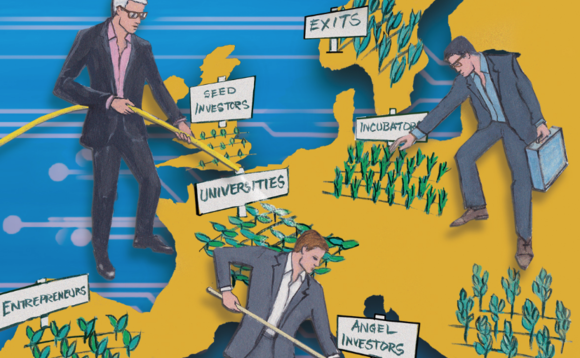
Nurturing Europe's VC eco-system

Europe’s technology sector is maturing nicely, with startup clusters sprouting up in its leading cities and LPs ploughing more investment into the continent. In this first instalment Kenny Wastell checks the pulse of this market
Over the past three years, the European venture capital sector has shown signs of flourishing. The bursting of the dotcom bubble in 2000 brought about an investment drought spanning more than 10 years, but Europe's startups are once more lapping up a steady stream of capital.
The re-emergence of Europe's tech market, in particular, is highlighted by a recent report from CB Insights and KPMG. The report finds that in each of the past five quarters, at least 68% of European venture capital investments have been in companies within the internet, mobile and software sectors.
"European venture is in the best shape it's been in for a long time," says Pantheon principal Dushy Sivanithy. "It is great to see US limited partners taking an interest in the continent for the first time in a very long time. Given their experience in venture capital, that has to be a good sign of the state of the market."
The attraction from international limited partners towards Europe can be attributed, in part, to soaring tech valuations elsewhere, particularly the US. Indeed, in April 2015 the Nasdaq surpassed its previous record high set in March 2000, shortly before the bubble burst. On the private market, prominent venture-backed US tech brands including Uber, Airbnb and Snapchat have reportedly received valuations of $50bn, $25bn and $16bn respectively in recent funding rounds. European valuations are more modest by comparison; a factor that has caught the eye of international investors.
The increased appetite for European tech companies has predictably resulted in a surge in fundraising within the continent. Vehicles launched in 2013 have highlighted this boom, accounting for €4.8bn of commitments to date, according to unquote" data - the highest amount raised over the past decade. "We are seeing first-time funds being raised and more established firms are in a very entrenched position here now," says Sivanithy. "There is more capital and – though much of that is in London – we are seeing it raised across Europe."
One venture capital firm to have recently raised its maiden fund is pan-European investor Felix Capital, led by Frederic Court. Felix held a final close on its hard-cap of $120m just nine months after launch - and did so without using a placement agent.
"There is a feeling among international LPs that the opportunity in Europe for technology-enabled companies is maturing," says Court. "While the continent has generally had less growth than some other markets, it is undergoing massive transformation through technology – as is the rest of the world. In addition, Europe has the benefit of being wealthy and developed, with a very high penetration of broadband and mobile. For all these reasons, Europe is very attractive."
London calling
The influx of investment and fundraising has coincided with the emergence of a number of startup clusters across the continent in recent years. London remains firmly at the top of this list, according to Court: "We will see a strengthening of these ecosystems as there are more reasons for people to be in the top technology capitals. In London, there is an incredible combination of entrepreneurial and executive talent from all over the world, in addition to capital and large tech companies. It is no coincidence that when Google and Facebook come to Europe to build campuses their main focus is London."
Yet other clusters have developed rapidly in recent years. The most widely acknowledged European competitor to London is Berlin, home to Rocket Internet. The listed incubator and investor has nurtured numerous successful startups including online food delivery platforms FoodPanda, which has raised $310m to date, and Delivery Hero, which was recently valued at $3.1bn.
White Star Capital managing partner Christian Hernandez – who previously led the international expansion of Facebook's business development platform and developer network groups – is keen to point out the attractions of the Berlin startup scene. "It has definitely earned its right as the second major hub next to London," he says. "The cost of living if you are a 25-year-old entrepreneur in London is pretty high. Berlin, in contrast, is incredibly cheap. It is also a pretty ‘hip-and-happening' city so people are attracted to it. When I visited most recently I was amazed at the number of entrepreneurs with global ambitions, building what they believe will become global companies."
A recent report by unquote" found Stockholm and Paris to be the third and fourth most active European cities, in terms of 2014 tech dealflow. Neither Hernandez, nor Felix's Court disagree with these findings and both highlight the positive signs surrounding the Parisian scene – though our report pointed only to a very slight uptick in tech dealflow within the city last year.
Stockholm, by contrast, has been soaring on this account. Of particular note, analysis by Atomico – the investment firm of Skype co-founder Niklas Zennström – shows the city produces the second-most $1bn-plus companies per capita in the world. Indeed, in addition to Skype, Stockholm also gave birth to Spotify, which was recently valued at more than $8.5bn, and King Digital Entertainment, which floated with a $7.5bn market cap in March 2014.
However, Europe has seen extremely high valuations for tech companies before, only to suffer the aforementioned collapse in confidence when the dotcom bubble burst. E-commerce business Boo.com has been held up as being indicative of Europe's past shortcomings. The company was founded in 1998, estimated to be worth $125m by August 1999 and collapsed by May 2000. The pertinent question is whether Europe has the ecosystem to back up the vast sums of money changing hands today.
According to Hernandez there are three keys to developing ecosystems that can support startups with global aspirations: talent, capital and cultural attitudes towards entrepreneurship. "It starts with the supply of talent from academic institutions and companies where people have been trained to become technical makers," he says. "Then there are cultural elements surrounding the view of entrepreneurship as a viable career option. Those factors combine with funding sources from angel, seed and later-stage investors to enable companies to scale."
The final pieces of the puzzle are buoyant exit markets and a willingness from successful entrepreneurs to back the next generation of startups with their own capital and expertise.
Basking in Europe's talent pool
Europe has a strong tradition of producing talent. In the most recent QS World University Rankings, the continent boasted eight of the top 20 institutions, six of which are British. Furthermore, as a result of its relative wealth and industrial history, it has developed a highly skilled workforce across a variety of sectors.
However, as Felix's Court points out, it is only with the recent advent of smartphone technology and high-speed connectivity that tech investment has enabled the continent to capitalise on much of this heritage. "The technological boom that was previously only really happening in a small number of segments – which were more specifically technology-based – is now happening in every segment," he explains. "As a result there is a lot of disruption and many large, established players are increasingly challenged by this. They just don't understand it as well, can't really hire the talent and have historic business models."
Court cites the creativity and lifestyle segments that Felix focuses on and how tech-enabled brands such as e-commerce platform Farfetch and music platform Soundcloud are capitalising on Europe's traditional talent pool. He also points to the emergence of London's fintech cluster and the decision by Facebook to set up one of its two global artificial intelligence centres in Paris. Both, he says, are examples of the spreading sphere of technological influence.
Idinvest Partners managing partner Benoist Grossmann believes European companies have an advantage over their US counterparts: Europe's engineers are more affordable and more loyal. Yet the flipside to Europe's established industrial heritage and relatively stable workforce is apprehension towards the concept of entrepreneurship. White Star's Hernandez refers to this as the "mum test", whereby one gauges the views of mothers to the idea of entrepreneurship as a viable career choice.
"The French school system," says Hernandez, "outputs some of the best algorithmic minds in the world, but the mum test fails in France. Mums want you to go to ENA, a school that creates top bureaucrats." Yet Grossmann is keen to point out the emergence of entrepreneurship programmes at most French business schools, which he says was not the case five or 10 years ago.
Regardless of France's scepticism towards entrepreneurship, Hernandez believes attitudes across Europe have warmed, a factor he attributes to increasing startup success stories. "My prime example is luxury lifestyle magazine Tatler, which I would call the bible of the establishment," he says. "It usually features a list of eligible dukes, but last year it featured a list of eligible 'geeks'. When it becomes that pervasive in mainstream media it is proof of a tipping point where entrepreneurship is an acceptable component."
However, James King, founder and business development manager at venture capital firm Fig, does not feel people should necessarily be encouraged to start companies. Instead, he believes the emphasis should be on creating an environment where those who decide to do so are given appropriate support. "Starting a business is scary, expensive and burdensome," he says. "It makes you go grey at 30. It is not for everyone. We need entrepreneurs who start companies because they are passionate about something and want to change it, or because they have seen a problem and want to address it."
With this in mind, King is sceptical about the logic behind entrepreneur societies set up in higher education establishments. In contrast, he argues it is more beneficial to target students who set up successful societies focusing on their passions. "We should be going to these students saying: ‘If you do ever want to start a business, the skills you need are the skills you are developing now by running your society'. We are talking in some cases about societies with millions in combined turnover, run by 22-year-olds," he says.
Look out for the second instalment tomorrow.
Latest News
Stonehage Fleming raises USD 130m for largest fund to date, eyes 2024 programme
Multi-family office has seen strong appetite, with investor base growing since 2016 to more than 90 family offices, Meiping Yap told Unquote
Permira to take Ergomed private for GBP 703m
Sponsor deploys Permira VIII to ride new wave of take-privates; Blackstone commits GBP 200m in financing for UK-based CRO
Partners Group to release IMs for Civica sale in mid-September
Sponsor acquired the public software group in July 2017 via the same-year vintage Partners Group Global Value 2017
Change of mind: Sponsors take to de-listing their own assets
EQT and Cinven seen as bellweather for funds to reassess options for listed assets trading underwater








